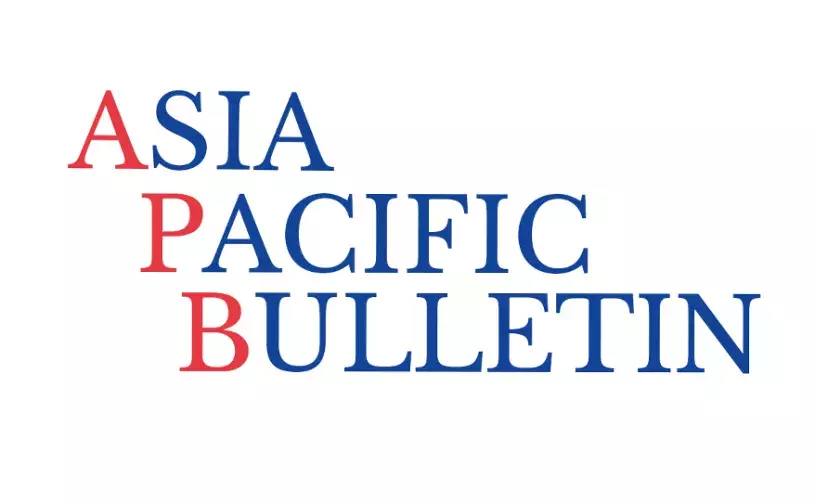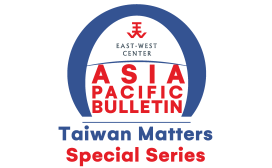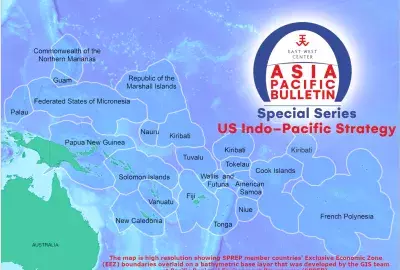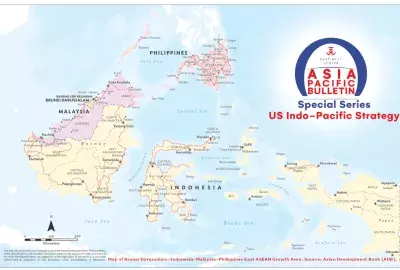

|
The Honorable Randall G. Schriver, Chairman of the Board at the Project 2049 Institute and former Assistant Secretary of Defense for Indo-Pacific Affairs, & Jennifer K. Hong Whetsell, Senior Director at the Project 2049 Institute, explain that "Taiwan, a leading democracy and one of the freest countries in the world, continues to combat coercive and annihilative threats from the People’s Republic of China (PRC), while not wavering on human rights." |
There is often a misconception that human rights and national security interests cannot coexist, that one must be compromised to achieve the goals of the other. Such a notion is not completely unfounded, as we often hear about democratic governments failing to call out the egregious violations of human rights by a government with which they have security relationships. Human rights and national security interests, however, are not a binary choice. Properly understood, the two are linked. We need to remember that national security is the security and defense of a sovereign state, which includes the humans who live within those state borders. The security of a nation’s humans, its citizens, includes the right for those citizens not to be exploited or abused, and thus fully and wholly protected by their government.
While this binary-framed debate pitting national security against human rights continues to remain prevalent in the current political context, the United States is fortunate to have a friend and ally that deeply cares about national security and human rights. Taiwan, a leading democracy and one of the freest countries in the world, continues to combat coercive and annihilative threats from the People’s Republic of China (PRC), while not wavering on human rights. Taiwan calls out human rights violations and supports other nations in restoring human security and dignity through humanitarian aid and disaster relief. The two nations should continue to uphold the values that we both cherish.
Taiwan and the United States, however, face increasing malign influence from the PRC and its rulers in the Chinese Communist Party (CCP). The CCP works to undermine the democratic, rule-based order in Taiwan and around the world. The CCP dictator, Xi Jinping has declared that Taiwan must be unified with China and has refused to rule out the “possible use of force” to achieve this end state. Every day, the CCP uses its military, diplomatic, and economic pressure to coerce Taiwan—destabilizing and undermining regional peace and stability. In addition to near-daily provocations, the CCP manipulates and coerces governments and international organizations to exclude and deny Taiwan’s existence as a legitimate, sovereign, and self-governing nation state. Today, only fourteen states have diplomatic relations with Taiwan, and Taiwan is not part of the United Nations or other international organizations. With the Biden administration and Congress looking to counter CCP influence around the world, Taiwan’s importance will continue to grow.
The United States and Taiwan must value human rights amid these security threats. One way is to continue cooperation on issues that uphold democratic values, including fighting censorship and content restrictions; promoting free and fair elections; and cooperating on anti-trafficking efforts.
- Fight censorship and content restrictions: The CCP coerces Taiwanese media outlets through intense pressure and exploitation of their parent companies located in the PRC. Taiwan journalists have reported censorship in publishing PRC- or CCP-critical news stories. In the United States, media outlets and entertainment industries censor content in fear of the CCP’s retaliatory reactions. A new study by the Centre for Information Resilience identified the CCP’s increasing “coordinated influence operation” on major social media platforms to push pro-China messages and distort perceptions on important issues. Both nations should call out the CCP’s attempts to censor truth and spread misinformation, and vigorously support and maintain an ecosystem that values freedom of information.
- Promote free and fair elections: Taiwan’s ability to conduct free and fair elections is a hallmark of a free society. The institution of the presidency has been respected and revered since 1996, even when others in the region have faltered and stumbled. As Taiwan prepares for its elections in 2024, the CCP will increase efforts in Taiwan to promote pro-Beijing candidates through disinformation and anti-West messaging and by undermining the electoral process. As seen in Hong Kong, the CCP celebrates the installation of a more pro-Beijing Chief Executive after years of increased enforcement of its draconian security laws and clamp down of expression of diverse views. The CCP is not shy about wanting the same for Taiwan. Therefore, Taiwan must hold the upcoming and all future elections with the highest integrity, welcoming the presence of international observers and journalists, and respecting the electoral process during and after voting. The United States should actively support Taiwan by respecting its electoral process and encouraging peaceful transitions of power. Both nations can demonstrate to the region and world the beauty of the sometimes messy, but always meaningful norms and values of democracy.
- Combat human trafficking: Human trafficking is a heinous crime that deprives men, women, and children of their freedom and dignity. This global crime permeates all societies, undermining the fabric of democracy. While Taiwan and Taiwan nationals are not immune from this scourge, Taiwan has embraced the transparency necessary to become a leader in the fight against trafficking. The United States and Taiwan should uphold the dignity of human life through vigorous investigation of human trafficking allegations, education of citizens, transparent reporting of violations, prosecution and sentencing of traffickers, and protection of victims through shelters and rehabilitation support systems.
Secondly, the United States should support Taiwan’s representation in international fora. Due to China’s suppression and marginalization of Taiwan’s international participation, Taiwan is not a member in many international forums. Taiwan’s lack of recognition in the United Nations prevents Taiwan from becoming a party to important international conventions such as the 1980 Hague convention on child abduction, 1951 convention on refugees, or the UN Palermo Protocol on trafficking. Taiwan also cannot cooperate with important entities like the Office of the UN High Commissioner for Refugees and the World Health Organization (WHO). Due to its absence of membership within WHO, the world was deprived of Taiwan’s resources and expertise as it masterfully handled the COVID-19 pandemic.
On May 13, 2022, President Biden signed into law the “Bill to Help Taiwan Regain WHO Status.” The United States can pursue similar actions domestically and in international forums to show its support for Taiwan. For instance, the United States can launch a campaign to achieve Taiwan’s formal membership in the United Nations, so that Taiwan continues to exercise its democratic vision and values and cement its place as a global leader in promoting human rights.
In sum, the United States and Taiwan have many shared values and interests, as well as many opportunities to cooperate. Taiwan has positioned itself as a leader of the free world and demonstrated a high support for human rights issues. In the US-Taiwan relationship, human rights, therefore, should not be viewed as a standalone issue apart from national security. These intertwined pursuits should be promoted and bolstered together by the United States and Taiwan today, and in the years to come.

|
The Honorable Randall G. Schriver, Chairman of the Board at the Project 2049 Institute and former Assistant Secretary of Defense for Indo-Pacific Affairs, & Jennifer K. Hong Whetsell, Senior Director at the Project 2049 Institute, explain that "Taiwan, a leading democracy and one of the freest countries in the world, continues to combat coercive and annihilative threats from the People’s Republic of China (PRC), while not wavering on human rights." |
There is often a misconception that human rights and national security interests cannot coexist, that one must be compromised to achieve the goals of the other. Such a notion is not completely unfounded, as we often hear about democratic governments failing to call out the egregious violations of human rights by a government with which they have security relationships. Human rights and national security interests, however, are not a binary choice. Properly understood, the two are linked. We need to remember that national security is the security and defense of a sovereign state, which includes the humans who live within those state borders. The security of a nation’s humans, its citizens, includes the right for those citizens not to be exploited or abused, and thus fully and wholly protected by their government.
While this binary-framed debate pitting national security against human rights continues to remain prevalent in the current political context, the United States is fortunate to have a friend and ally that deeply cares about national security and human rights. Taiwan, a leading democracy and one of the freest countries in the world, continues to combat coercive and annihilative threats from the People’s Republic of China (PRC), while not wavering on human rights. Taiwan calls out human rights violations and supports other nations in restoring human security and dignity through humanitarian aid and disaster relief. The two nations should continue to uphold the values that we both cherish.
Taiwan and the United States, however, face increasing malign influence from the PRC and its rulers in the Chinese Communist Party (CCP). The CCP works to undermine the democratic, rule-based order in Taiwan and around the world. The CCP dictator, Xi Jinping has declared that Taiwan must be unified with China and has refused to rule out the “possible use of force” to achieve this end state. Every day, the CCP uses its military, diplomatic, and economic pressure to coerce Taiwan—destabilizing and undermining regional peace and stability. In addition to near-daily provocations, the CCP manipulates and coerces governments and international organizations to exclude and deny Taiwan’s existence as a legitimate, sovereign, and self-governing nation state. Today, only fourteen states have diplomatic relations with Taiwan, and Taiwan is not part of the United Nations or other international organizations. With the Biden administration and Congress looking to counter CCP influence around the world, Taiwan’s importance will continue to grow.
The United States and Taiwan must value human rights amid these security threats. One way is to continue cooperation on issues that uphold democratic values, including fighting censorship and content restrictions; promoting free and fair elections; and cooperating on anti-trafficking efforts.
- Fight censorship and content restrictions: The CCP coerces Taiwanese media outlets through intense pressure and exploitation of their parent companies located in the PRC. Taiwan journalists have reported censorship in publishing PRC- or CCP-critical news stories. In the United States, media outlets and entertainment industries censor content in fear of the CCP’s retaliatory reactions. A new study by the Centre for Information Resilience identified the CCP’s increasing “coordinated influence operation” on major social media platforms to push pro-China messages and distort perceptions on important issues. Both nations should call out the CCP’s attempts to censor truth and spread misinformation, and vigorously support and maintain an ecosystem that values freedom of information.
- Promote free and fair elections: Taiwan’s ability to conduct free and fair elections is a hallmark of a free society. The institution of the presidency has been respected and revered since 1996, even when others in the region have faltered and stumbled. As Taiwan prepares for its elections in 2024, the CCP will increase efforts in Taiwan to promote pro-Beijing candidates through disinformation and anti-West messaging and by undermining the electoral process. As seen in Hong Kong, the CCP celebrates the installation of a more pro-Beijing Chief Executive after years of increased enforcement of its draconian security laws and clamp down of expression of diverse views. The CCP is not shy about wanting the same for Taiwan. Therefore, Taiwan must hold the upcoming and all future elections with the highest integrity, welcoming the presence of international observers and journalists, and respecting the electoral process during and after voting. The United States should actively support Taiwan by respecting its electoral process and encouraging peaceful transitions of power. Both nations can demonstrate to the region and world the beauty of the sometimes messy, but always meaningful norms and values of democracy.
- Combat human trafficking: Human trafficking is a heinous crime that deprives men, women, and children of their freedom and dignity. This global crime permeates all societies, undermining the fabric of democracy. While Taiwan and Taiwan nationals are not immune from this scourge, Taiwan has embraced the transparency necessary to become a leader in the fight against trafficking. The United States and Taiwan should uphold the dignity of human life through vigorous investigation of human trafficking allegations, education of citizens, transparent reporting of violations, prosecution and sentencing of traffickers, and protection of victims through shelters and rehabilitation support systems.
Secondly, the United States should support Taiwan’s representation in international fora. Due to China’s suppression and marginalization of Taiwan’s international participation, Taiwan is not a member in many international forums. Taiwan’s lack of recognition in the United Nations prevents Taiwan from becoming a party to important international conventions such as the 1980 Hague convention on child abduction, 1951 convention on refugees, or the UN Palermo Protocol on trafficking. Taiwan also cannot cooperate with important entities like the Office of the UN High Commissioner for Refugees and the World Health Organization (WHO). Due to its absence of membership within WHO, the world was deprived of Taiwan’s resources and expertise as it masterfully handled the COVID-19 pandemic.
On May 13, 2022, President Biden signed into law the “Bill to Help Taiwan Regain WHO Status.” The United States can pursue similar actions domestically and in international forums to show its support for Taiwan. For instance, the United States can launch a campaign to achieve Taiwan’s formal membership in the United Nations, so that Taiwan continues to exercise its democratic vision and values and cement its place as a global leader in promoting human rights.
In sum, the United States and Taiwan have many shared values and interests, as well as many opportunities to cooperate. Taiwan has positioned itself as a leader of the free world and demonstrated a high support for human rights issues. In the US-Taiwan relationship, human rights, therefore, should not be viewed as a standalone issue apart from national security. These intertwined pursuits should be promoted and bolstered together by the United States and Taiwan today, and in the years to come.







